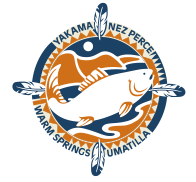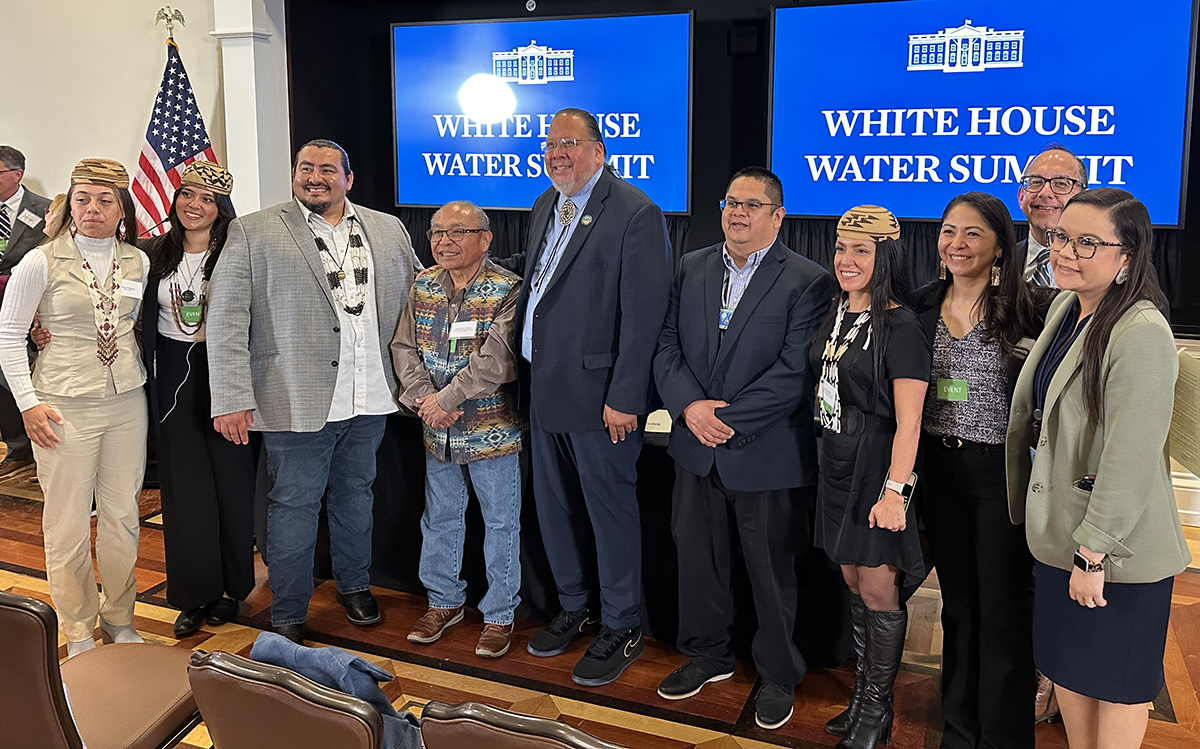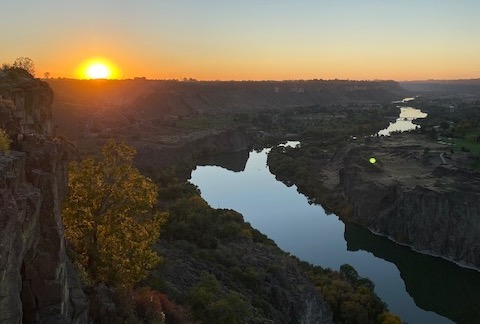By Jill-Marie Gavin and Andrea Tulee, CRITFC Communications
Auburn, Wash. – Tribal leaders, activists, and legal experts gathered to commemorate the 50th anniversary of the historic U.S. District Court ‘Boldt decision’ at the Muckleshoot Casino Feb. 6-7. The two-day event hosted by the Northwest Indian Fisheries Commission (NWIFC) filled the event center to capacity and even had a waiting list of people hoping to be a part of the commemoration.
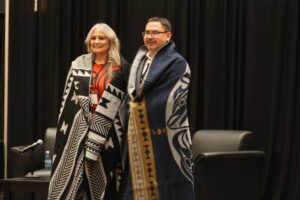
Lisa Wilson, NWIFC Vice Chair (left), and Justin Parker, NWIFC Executive Director (right), receive blankets in recognition after their insightful discussion on the ongoing battle to safeguard tribal treaty fishing rights on February 7. Wilson, a Lummi Indian Business Council member, and Parker, a member of the Makah tribe, were honored for their dedication to the modern-day fight for tribal rights.
NWIFC Executive Director Justin Parker shared that the planning for the commemoration began two years ago. Planners developed a program that delved into the historical context of treaty fishing, pre-Boldt; discussed the Fish Wars; and honored the life of dedicated fishing rights activist Billy Frank, Jr.
Over two days, a variety of Native and non-Native speakers share their stories, insights, and experiences. Elders in their 70’s and 80’s who were veterans of the Fish Wars recounted the struggle to reaffirm tribal treaty fishing rights. Tribal leaders talked about the changes that have taken place since the decision and the ongoing issues facing tribal treaty fishing rights and salmon protection into the future. A panel of non-Indian public school students were invited to talk about what they learn now in schools about tribal treaty fishing rights, the Fish Wars, and Billy Frank, Jr. For Columbia River tribal leaders, this was a time to reflect on the close relationship of the early rulings of Judge Belloni in U.S. v. Oregon and Judge Boldt in U.S. v. Washington.
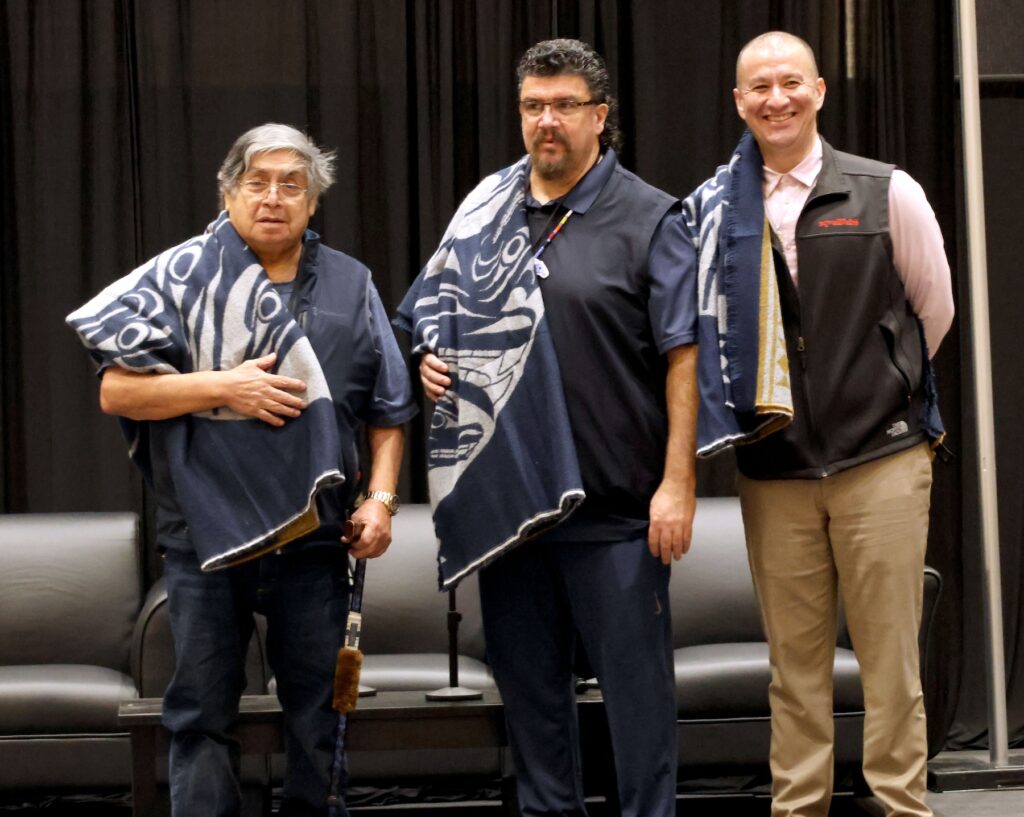
Columbia River Inter-Tribal Fish Commission Commissioner Wilbur Slockish, Jr. (left), Muckleshoot Indian Tribal member Phil Hamilton (center), and Nisqually Tribe Chair Willie Frank III (right) receive honors following their discussion on recognizing fish warriors on February 7. The event celebrated their dedication to honoring and preserving the legacy of those who fought for tribal fishing rights.
The Boldt Decision
In September 1970, the United States Attorney filed an action in the US District Court for the Western District of Washington. The filing alleged that Washington had infringed on the treaty rights of the Hoh, Makah, Muckleshoot, Nisqually, Puyallup, Quileute, and Skokomish tribes. Later, the Lummi, Quinault, Sauk-Suiattle, Squaxin Island, Stillaguamish, Upper Skagit, and Yakama tribes intervened in the case, U.S. v. Washington.
On February 12, 1974, US District Judge George Boldt issued his decision. In his decision, Judge Boldt ruled that when the tribes conveyed millions of acres of land in Washington State through a series of treaties signed in 1854 and 1855, they reserved the right to continue fishing. Boldt used the minutes of the treaty negotiations to interpret the meaning of the treaty language “in common with” as the United States described it to the tribes. He ruled that the United States intended for there to be an equal sharing of the fish resource between the tribes and the settlers. Boldt ruled that this meant “sharing equally the opportunity to take fish… therefore, nontreaty fishermen shall have the opportunity to take up to 50% of the harvestable number of fish… and treaty right fishermen shall have the opportunity to take up to the same percentage.”
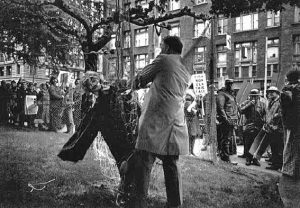
The decision sparked protests from non-Indian fishers and others, some even burning effigies of Judge Boldt. Photo: Alaska Native News
The Boldt decision also had spillover effects that reaffirmed tribal management powers, reshaped Indian Law, and set a course for significant advances in tribal self-determination and governance.
The Boldt decision came just five years after the precedent setting opinion in Sohappy v. Smith/U.S. v. Oregon where US District Judge Belloni ruled that the four Columbia River treaty tribes had an “absolute right” to a “fair share” of the fish runs destined to pass the tribes’ fisheries. Judge Belloni also ruled the state was limited in its power to regulate treaty Indian fisheries. Belloni ruled that the state could only regulate when “reasonable and necessary for conservation.” Further, he ruled that state conservation regulations cannot discriminate against the tribes and those regulation must use the least restrictive means necessary.
In 1974, Judge Belloni applied Boldt’s 50/50 principle to further define the tribal “fair share” of Columbia River fisheries. By 1977, after Judge Belloni urged the parties to U.S. v. Oregon to negotiate a management agreement to effectuate his rulings, he approved the first tribal-state management agreement in U.S. v. Oregon. In Settler v. Lameer, the Ninth Circuit Court of Appeals ruled that the treaty fishing right was a tribal right, not an individual right, and that tribes had reserved the authority to regulate tribal fishing both on and off the reservation. The U.S. v. Oregon case remained under the continuing jurisdiction of the United Sates courts for more than 50 years.
“The combination of the Belloni and Boldt decisions was a victory for tribes,” said Aja DeCoteau, CRITFC executive director. “Over the long term, the Judges’ rulings resolved conflicts between state resources management and U.S. commitments in treaties. They set the tribes and states onto a path of co-management of the region’s fisheries.”
Realizing this success was neither quick nor easy, however. “These cases faced tremendous hostility from states, commercial fishers, and sports fishers,” commented Corinne Sams, CRITFC Chair. “But despite the threats, tribal people stood firm.”
“Our people sacrificed and fought to protect, access, and harvest salmon and other anadromous fish, said Sams. “We have taken care of our salmon and other First Foods since time immemorial. We have been imprisoned, beaten, and ridiculed for practicing our way of life and secured rights. Continuing to stand up for salmon and our rights to harvest them has been our life’s work.”
In emphasizing the enduring commitment of the Columbia River treaty fishing tribes to preserving their ancestral fishing grounds, Sams highlighted the profound impact of the Boldt decision, not only in securing legal rights but also in fostering collaboration between tribal entities and state authorities for the sustainable management of these vital resources.
“The 50 years since the Boldt decision has helped federal, state, county, and municipal governments recognize and work with tribes to continue to take care of these resources we all benefit from, Indian and non-Indian alike,” said Sams.
A History of Fishers Standing Up for Tribal Fishing Rights
For many of the attendees, the highlight of the event was hearing directly from the elders who experienced the Fish Wars and described the violence, racism, police brutality, and incarceration they faced in exercising their treaty-reserved fishing rights.
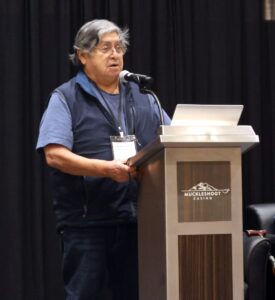
CRITFC commissioner and member of the Yakama Nation, Wilbur Slockish, Jr., recounts his life on the Columbia River during the Fish Wars before the Belloni and Boldt Decisions. Slockish, Jr. spent three years in the federal correctional system in prisons across the country after being arrested for practicing his treaty fishing rights on the Columbia River.
Wilbur Slockish, Jr., a commissioner of the Columbia River Inter-Tribal Commission (CRITFC) representing the Yakama Nation, was in the first panel of the event, which was the witnesses from the elders. Slockish, who grew up along the Columbia River, witnessed firsthand the impact of the decisions on tribal fishers in the Columbia River basin. Slockish went into depth recounting the three-year federal prison sentence he served after being arrested for “illegal” fishing on the Columbia River before the Boldt decision.
“They asked me if I fished illegally. I told them I am only doing what my Creator said to do. He placed our foods here for our use and benefit if we take care of them, and that’s what we try to do to the best of our ability,” said Slockish.
Slockish also shared a harrowing personal account of the horrors of the federal prison system where he was incarcerated.
“I want people to be mindful and be careful so their children don’t face the same harsh prison conditions. But I would do it again, to protect my foods, our foods. Salmon belongs to all the people on the river. Our foods provide us with clothes, with food and with shelter. Our people were managing these fish and there were millions of fish. I hope we will unite to stop the decimation of our food,” he said.
Other elders spoke on how the Belloni and Boldt decisions reshaped the lives of tribal fishers along the river, with particular emphasis on the determination and dedication of Bill Frank, Jr. in helping create a more just system that centered on partnership.
“Billy Frank, Jr. was a light we could all follow, and in 2014 that light was snuffed out. That light that we all depended on for so long to guide us. When you lose a light like that you find yourself a little lost a little confused, asking ‘Now what?’,” Bill Kallapa of the Makah Tribe said.
He went on to share Frank’s message of working together as tribal leaders and people.
“He was the one who seemed to drive everything to bring everyone together. His gift was that light, the gift he gave to all of us now we all have that light too. That was his gift to everyone in this room and if we all come together that light can shine brighter. It’s not gone and if we all pull together, we can do anything. Take care of your light,” Kallapa said in closing.
Honoring Judge Boldt
The event also featured Judge Boldt’s daughter, Virginia Boldt Riedinger, and grandson, Jeff Riedinger who spoke on behalf of the late judge, remembering the threats and pressure he faced after his groundbreaking ruling. They were honored with an honor song by Muckleshoot canoe family and gifted Pendleton blankets.
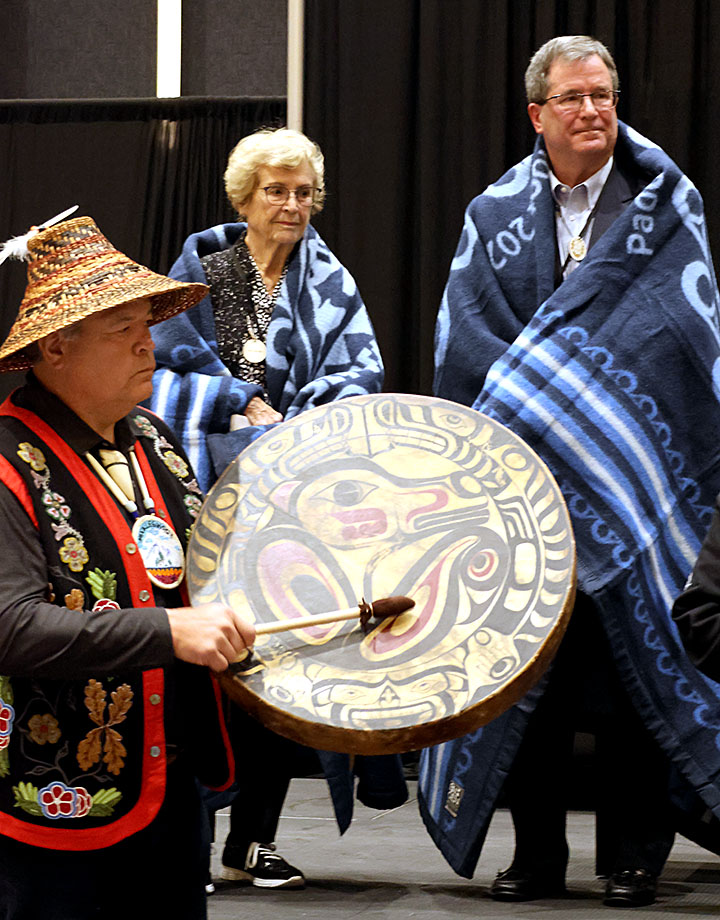
Family of the late Judge Hugo Boldt stand for an honor dance delivered by Muckleshoot tribal dancers and drummers Feb. 6. The group drummed, dance and sang one of their customary honor songs for Judge Boldt’s daughter, Virginia Boldt Riedinger, left, and grandson, Jeff Riedinger, right. Both Boldt family members were also honored with Pendleton blankets as speakers for the event.
“Following the time of my dad’s decision, he was vilified and hung in effigy. He received skads of hate mail and was left to enforce the law himself when his fellow state legislators, politicians, and lawyers would not uphold [the decision]. What courage he showed when he never wavered in his belief that he made the right decision,” Boldt Riedinger said. It was not until the federal government stepped in to enforce the law themselves in 1977 that Judge Boldt received respite from the onslaught of harassment following his decision his daughter shared.
“I just wanted you all to know that it wasn’t just the Indians who were brave during this time,” Boldt Riedinger added, after being presented with a blanket and getting a standing ovation from the event attendees.
An Enduring Impact
The effect of the ruling on Pacific Northwest tribes, including the four Columbia River treaty fishing tribes, remains profound.
Fifty years after the Boldt decision, its legacy continues to shape legal battles and discussions around treaty rights. Its impact is still being felt and interpreted. In 2007, the Boldt decision was extended to address habitat issues, reaffirming the importance of a sustainable fishery to the tribal treaty fishing right. It was also used as a basis to halt a liquefied natural gas terminal in Lummi territory to preserve salmon fisheries and habitat and the culverts case that ordered the State of Washington to replace all salmon-blocking culverts in the state by 2030.
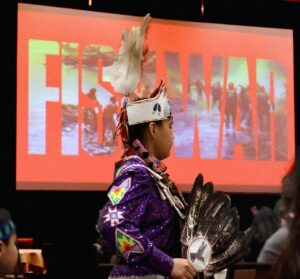
Muckleshoot jingle dress dancer at USvWA 50th Boldt Decision commemoration on Feb. 6, showcasing pow wow dances before a screening of the FISH WAR film by NWIFC and North Forty Productions.
The impact of the Boldt decision will likely continue to be felt into the future. In the film “FISH WAR” that was premiered at the event, tribal leaders spoke of it potentially being used to force climate action to address impacts climate change is having on the salmon resource.
This cornerstone of contemporary efforts to safeguard salmon, protect and restore the habitats and ecosystem that supports healthy fish runs, and uphold tribal treaty rights helped shape the world we live and work in. It brought adversaries together to become partners protecting our shared resource.
“In salmon recovery, over the years since the Boldt decision, we learned that we can’t do this alone, we have to do it together,” commented former chair for the Confederated Tribes of the Umatilla and past CRITFC commissioner, N. Kathryn Brigham. “True partnership is what we need to rebuild our natural resources. We must listen as much as we need to speak to each other. We must seek solutions together.”
